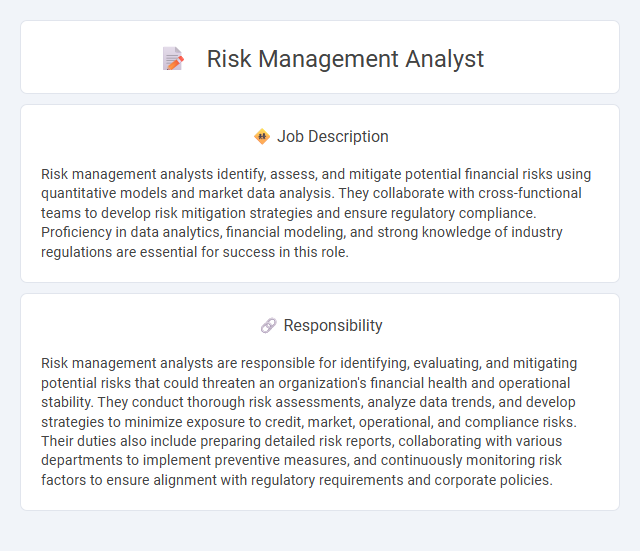
Risk management analysts identify, assess, and mitigate potential financial risks using quantitative models and market data analysis. They collaborate with cross-functional teams to develop risk mitigation strategies and ensure regulatory compliance. Proficiency in data analytics, financial modeling, and strong knowledge of industry regulations are essential for success in this role.
Individuals with strong analytical skills, attention to detail, and a calm demeanor under pressure are likely to be well-suited for a Risk Management Analyst role. Those who excel in interpreting data, assessing potential threats, and making strategic decisions may find this career fitting to their strengths. However, people who struggle with ambiguity or high-stress environments might face challenges thriving in this position.
Qualification
A Risk Management Analyst typically requires a bachelor's degree in finance, economics, business administration, or a related field, with many employers preferring candidates holding certifications such as FRM (Financial Risk Manager) or CFA (Chartered Financial Analyst). Essential skills include proficiency in risk assessment tools, statistical analysis, financial modeling, and strong knowledge of regulatory compliance standards. Experience with data analytics software like SAS, R, or Python enhances the ability to identify, evaluate, and mitigate financial risks effectively.
Responsibility
Risk management analysts are responsible for identifying, evaluating, and mitigating potential risks that could threaten an organization's financial health and operational stability. They conduct thorough risk assessments, analyze data trends, and develop strategies to minimize exposure to credit, market, operational, and compliance risks. Their duties also include preparing detailed risk reports, collaborating with various departments to implement preventive measures, and continuously monitoring risk factors to ensure alignment with regulatory requirements and corporate policies.
Benefit
Risk management analysts likely improve organizational decision-making by identifying potential threats and evaluating their impact, which may lead to enhanced financial stability and reduced losses. Their expertise probably helps companies allocate resources more efficiently and comply with regulatory requirements, decreasing the likelihood of costly penalties. Employers might benefit from predictive insights that support strategic planning and foster a culture of proactive risk mitigation.
Challenge
Risk management analysts likely face the challenge of accurately predicting potential threats amid constantly changing market conditions and regulatory landscapes. They probably need to balance risk mitigation with business objectives, navigating uncertain data and complex financial models. The role often demands quick decision-making under pressure while maintaining attention to detail and strategic thinking.
Career Advancement
Risk management analysts play a critical role in identifying and mitigating potential financial and operational risks for organizations, offering a strong foundation for career advancement into senior risk management or chief risk officer positions. Gaining expertise in quantitative analysis, regulatory compliance, and using advanced risk assessment software enhances opportunities for promotion and specialization in sectors such as finance, insurance, and consulting. Continuous professional development, including certifications like FRM (Financial Risk Manager) or CRM (Certified Risk Manager), significantly increases career prospects and earning potential in this competitive field.
 kuljobs.com
kuljobs.com